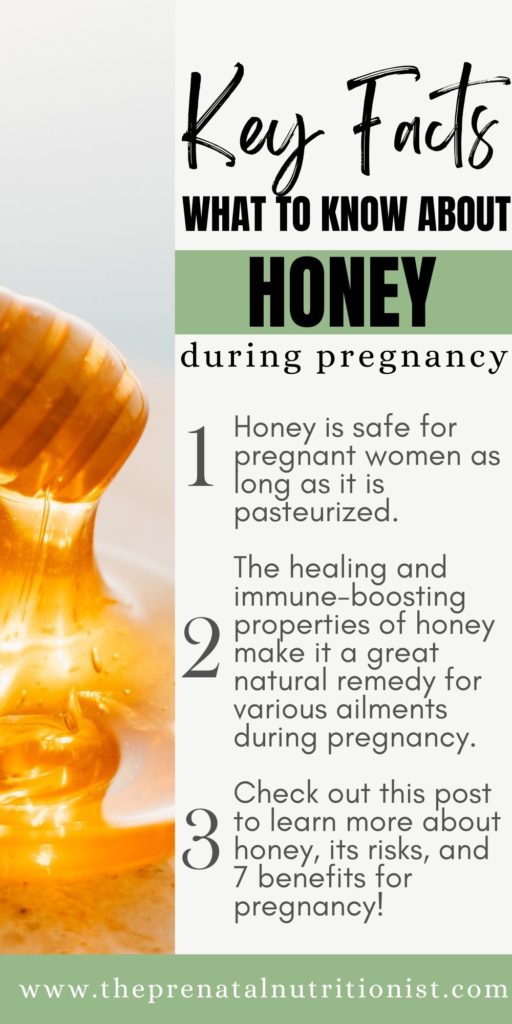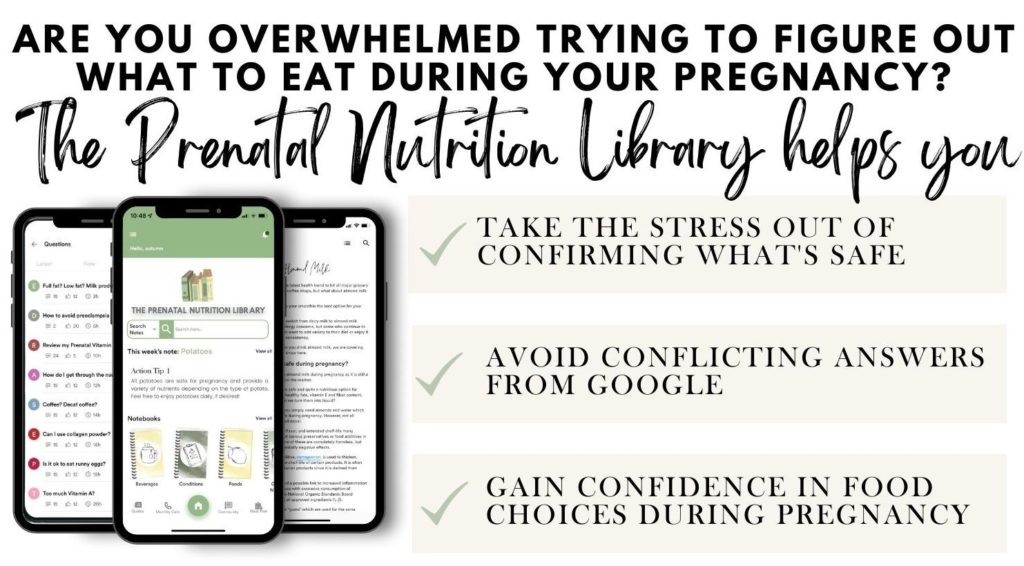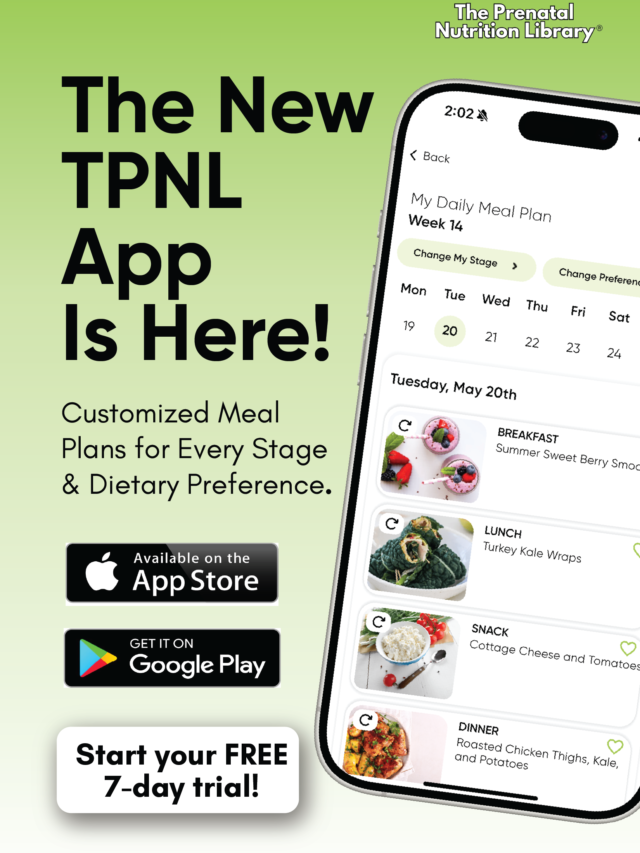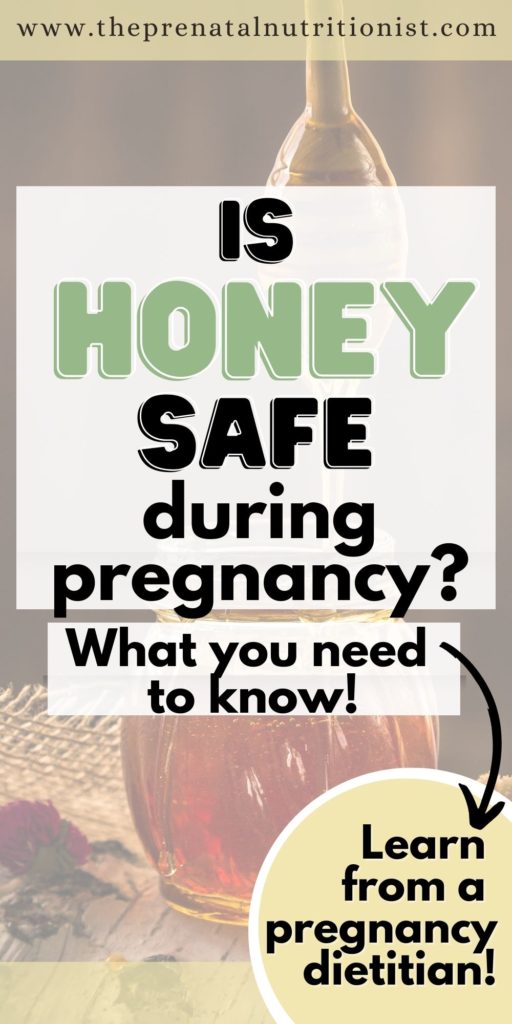
Sticky, sweet, and golden-hued honey is the product of exhaustive work by thousands of female bees. Once it’s collected from a hive, honey becomes one of the most useful items in the kitchen. It’s most commonly used to add sweetness to various recipes and products on the market.
Honey is a safe sweetener option to use during pregnancy. However, it’s best to avoid raw honey during pregnancy and choose a pasteurized option. Pasteurization helps to reduce the risk of pathogens and the potential to cause foodborne illnesses.
One of the biggest reasons people question whether it’s safe or not to eat honey during pregnancy is because it is NOT recommended for children under one-year-old. This is because honey can contain the bacteria called Clostridium botulinum and cause a rare but serious illness called infant botulism.
Fortunately, most people don’t have to worry about botulism. Adults and older children have developed immune systems that can defend against these bacteria, but infants lack this protection. Even in the rare cases when pregnant people have contracted botulism, it didn’t cause problems with the pregnancy or childbirth.
With that in mind, let’s take a closer look at the benefits of consuming honey during pregnancy.
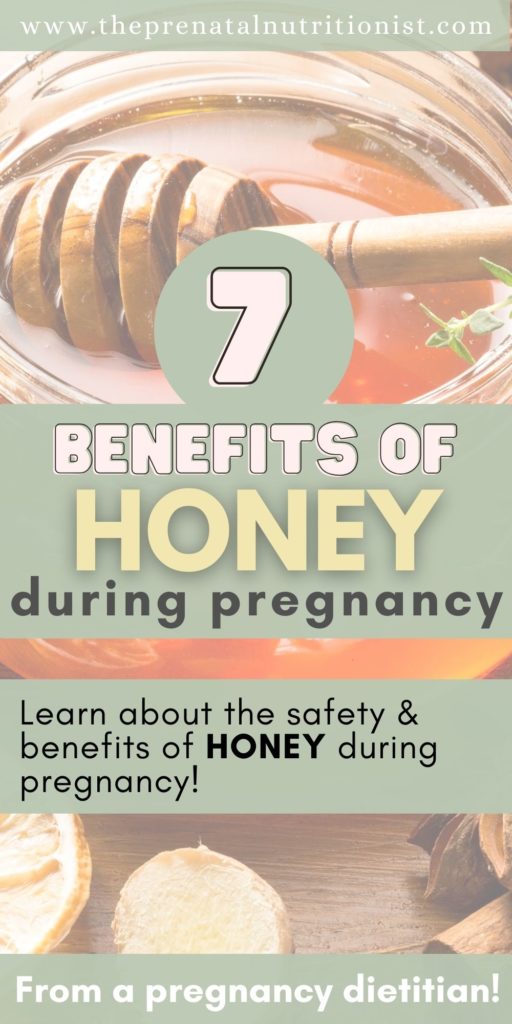
7 Benefits Of Honey During Pregnancy
May Have Immune Health Benefits
According to literature and ancient practices, honey has antibacterial and antioxidant properties that can help support immune health. Of course, honey is not a cure-all. The best way to support immune health with nutrition is to eat a well-rounded, nutrient-dense diet full of colorful produce.
Honey has traditionally been used as a topical treatment for minor cuts, burns, and wounds for these reasons as well. This is outside of the scope of practice of a dietitian. It’s very important to discuss this use with your doctor before trying. Additionally, using medical-grade or sterilized honey in these instances would be essential.
Promotes Good Sleep
Many pregnant women also swear by honey as a “cure” for insomnia. Honey for insomnia dates back to an old Ayurvedic practice. It contains an amino acid called tryptophan, which can be converted into serotonin and then into melatonin, a hormone that regulates sleep-wake cycles.
The idea is to mix a small amount of honey into a glass of milk or herbal tea and drink it before bedtime to encourage restful sleep. However, individual responses to honey can vary, and it should be considered as part of a broader approach to supporting sleep, including maintaining a healthy sleep routine.
Check out my cookbook for more delicious recipes, including several that use honey!

May Provide Relief From Cough, Sore Throat, and Cold Symptoms
The anti-inflammatory and mild anti-bacterial properties in honey may help relieve common cold symptoms like sore throat or a cough. Honey is an especially effective remedy to soothe a sore throat. It can help coat the throat, reducing irritation and coughing.
Mix a small amount of honey with ginger and warm water or herbal tea to try this remedy. Remember that while honey can relieve a sore throat, it should not replace medical advice or treatment, especially if your symptoms persist or worsen.
May Help Relieve Heartburn and Reflux
If you’re one of the many pregnant women who experience heartburn and reflux while expecting, honey may be a helpful tool. It’s important to note the results vary from person to person, and relief is generally only temporary if it is effective. Download The Prenatal Nutrition Library App on Apple or Android to get our FREE heartburn quick guide for more tips!
Natural Sweetener Choice
Honey is a safe sweetener option and alternative to refined or artificial sweeteners. While honey will still raise blood sugar levels just like other types of sugar, research has suggested that the antioxidants in honey may help protect against metabolic syndrome and type 2 diabetes.
Compared to table sugar, honey has a slightly lower glycemic index and some vitamins, minerals, and antioxidants. But it’s important to practice moderation and avoid excessive consumption. This is especially important for expectant mothers with gestational diabetes.
What does this mean? I’m not saying, “Go ahead and eat a bunch of honey to improve fasting blood sugar levels.” However, when a sweetener is needed in a recipe or food, honey is a choice that has some benefits compared to other options.
Reduces Seasonal Allergies
Research also suggests that regular consumption of honey may help reduce seasonal allergy symptoms. The idea is that consuming honey produced by local bees helps expose the body to small amounts of pollen and other local allergens. Over time, this exposure might help your body become less sensitive to these specific pollens.
You can add honey to your favorite warm beverage or mix a small amount into a high-protein Greek yogurt or oatmeal bowl for an easy way to eat honey while pregnant. Stick to just one or two tablespoons of honey to be mindful of your overall added sugar intake. (Check out this post to learn more about the benefits of oatmeal for pregnancy!)
Scientific evidence supporting this concept is limited, and the effectiveness of honey for allergy relief varies among individuals. Various pollens usually trigger seasonal allergies, and honey may not provide relief for all of them.
Energy Boost
Fatigue is a common pregnancy symptom that can hit hard in the early months. Nutrition plays a significant role in energy levels in and outside pregnancy, so looking to food to help is a significant first step.
The natural sugars in honey provide a quick energy source, which can be especially helpful during pregnancy when fatigue is common. You can even try chewing on honey sticks while you are in labor for a quick energy source to endure the marathon of delivering a baby!
We also want to fight fatigue and boost energy by focusing on hydration, regular meals and snacks rich in protein and fat, and foods rich in B vitamins (especially B12), vitamin D, zinc, and iron.
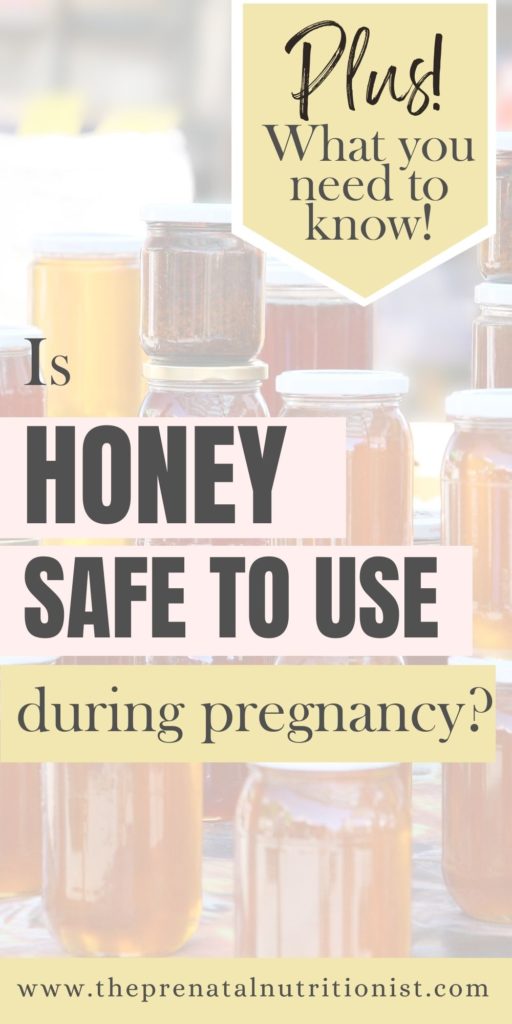
Honey is a safe sweetener option for pregnancy; the best practice is to choose pasteurized honey!
The potential benefits and added vitamins, minerals, and antioxidants make honey an acceptable natural sweetener option for pregnancy. Raw honey is not “dangerous,” however, best practice for food safety recommends choosing pasteurized honey during pregnancy. Pasteurization helps to reduce the risk of foodborne illness and pathogens.
Head over to the blog to find answers to your most frequently asked preconception and pregnancy nutrition questions.
Then, sign up for The Prenatal Nutrition Library (TPNL) to access THOUSANDS of guides and answers to pregnancy nutrition questions. Once you sign up for TPNL, you can search nutrients, foods, and supplements for a quick, evidence-based answer (at your fingertips with our App!!). Sign up here!
Want to try a sample meal plan first? Grab our FREE 1-week meal plan here. Now that’s an offer that’s as sweet as honey!
